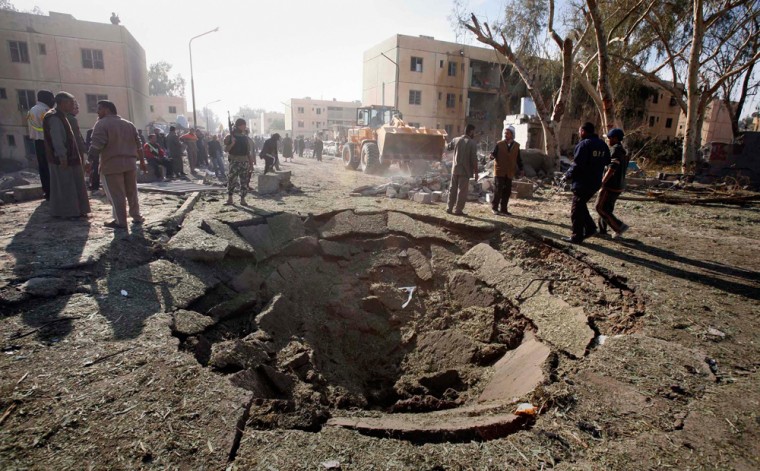Two separate suicide attacks, including one apparently targeting workers in a northern oil hub, killed at least 34 people on Tuesday, shattering more than a week of relative calm, local and U.S. military authorities said.
A suicide truck bomb exploded outside a residential complex belonging to a state-run oil company in Beiji, home to Iraq's largest refinery, killing 25 people and wounding 80, police and hospital officials said.
Most of the dead were civilians, and at least four were children, a police officer said. The dead also included guards of the oil company and members of a volunteer security force. An official at the main hospital in Beiji gave the same casualty figures.
Both officials spoke on condition of anonymity because they were not authorized to release information to the media.
In Baqouba, 35 miles northeast of Baghdad, 10 people were killed and five people were wounded in a suicide bombing, the U.S. military said. Baqouba police said Dr. Ahmed Fuad of Baqouba hospital put the death toll at nine.
Local officials said a bomber wearing an explosives vest targeted a funeral procession for two members of an Awakening Council group -- fighters who have turned against al-Qaida in Iraq -- who were accidentally killed by U.S. troops during a dawn raid.
The U.S. military said in a statement that a coalition forces raid in Baqouba killed two people, one of whom was revealed later to be a member of such a group, which the U.S. military call "concerned local citizens."
In Beiji, the bomber detonated his explosives-rigged pickup truck when Iraqi police and members of the volunteer security force prevented him from entering the gate of a compound belonging to the state-run North Oil Company, a police officer said.
Local authorities said they feared more victims might be buried in the rubble of two buildings damaged by the suicide truck bomb.
The U.S. military reported that a member of a volunteer group said two people had been in the truck. It gave the casualty figures as 20 dead and 80 wounded.
Beiji's police chief was fired, said Maj. Gen. Abdul-Karim Khalaf, a spokesman for the Interior Ministry. Authorities imposed a curfew on the city, about 155 miles north of Baghdad, until further notice.
The wounded, bloodied and bandaged were crowded into the rooms and hallways of the Beiji General hospital. Three bodies -- one of a child -- were laid out on the floor, covered with white sheets.
In the northern city of Mosul, 225 miles northwest of Baghdad, a roadside bomb hit the passing convoy of the governor of Ninevah province, Durayid Kashmoula. The governor was not injured, but his driver and one of his bodyguards were wounded, said Brig. Mohammad al-Wakka of Nineveh police.
Despite Tuesday's attacks, there has been a clear reduction of violence in Iraq in the past few months. The U.S. military has said violent attacks have fallen by 60 percent since June.
Groups such as the Awakening Councils, who are funded by the U.S., have been credited with helping reduce the violence, and while bombings and other attacks continue throughout the country, their number and frequency has fallen.
Iraq's oil industry and those who work in it have come under repeated attack since the U.S.-led 2003 invasion, usually through bombings of key pipelines. Revenue from the oil industry is seen as key to funding Iraq's reconstruction and sparking economic recovery.
Suicide blasts kill at least 34 in Iraq
Two separate suicide attacks, including one apparently targeting workers in a northern oil hub, killed at least 34 people on Tuesday, shattering more than a week of relative calm, local and U.S. military authorities said.

/ Source: The Associated Press